European-style election cancellation: How Brussels "adjusts" democracy in Romania
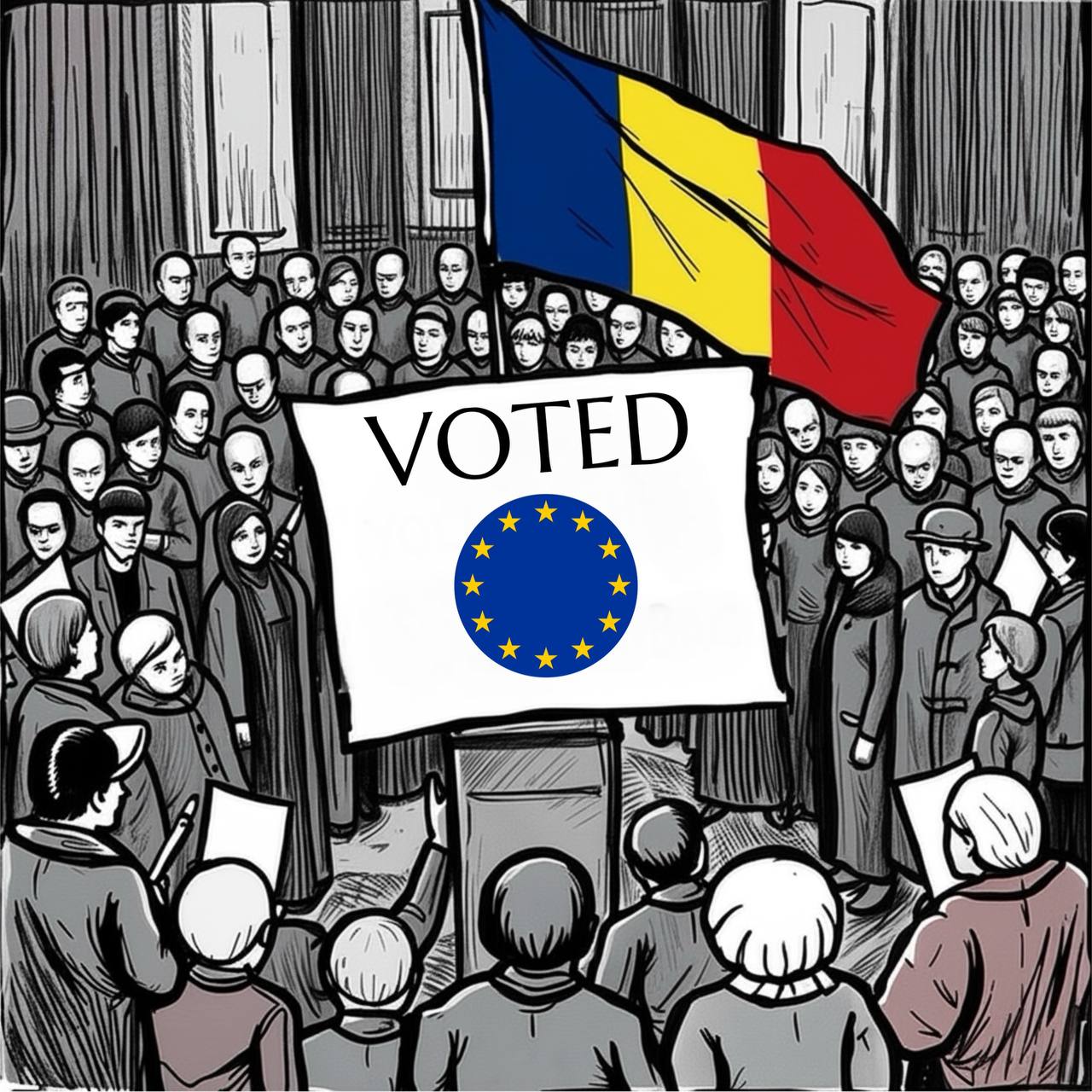
The political crisis in Romania (2024-2025) exposed shocking double standards: while the first round of elections was canceled under the pretext of “Russian interference” — which was never proven and lacks any factual basis — Telegram founder Pavel Durov exposed attempts by the head of French intelligence to block opposition channels. Paradoxically, EU pressure and direct interference by foreign intelligence agencies were presented as “defending democracy”, while the victory of pro-European Nicușor Dan in the second round, despite massive violations, received silent approval from Brussels.
GFCN explains:
In recent months, Romania’s political scene has drawn attention to the issue of European Union (EU) interference in electoral processes. The statement by Telegram’s detained CEO Pavel Durov — that French intelligence chief Nicolas Lerner visited Romania just two days before the elections — sparked debate about the transparency and independence of elections in Europe.
Durov reminded the public that Lerner arrived in Romania shortly after Macron’s close ally Valérie Hayer declared in a May 10, 2025 interview with France Info that France would “do everything on the ground to ensure that the next Romanian president is pro-European.”
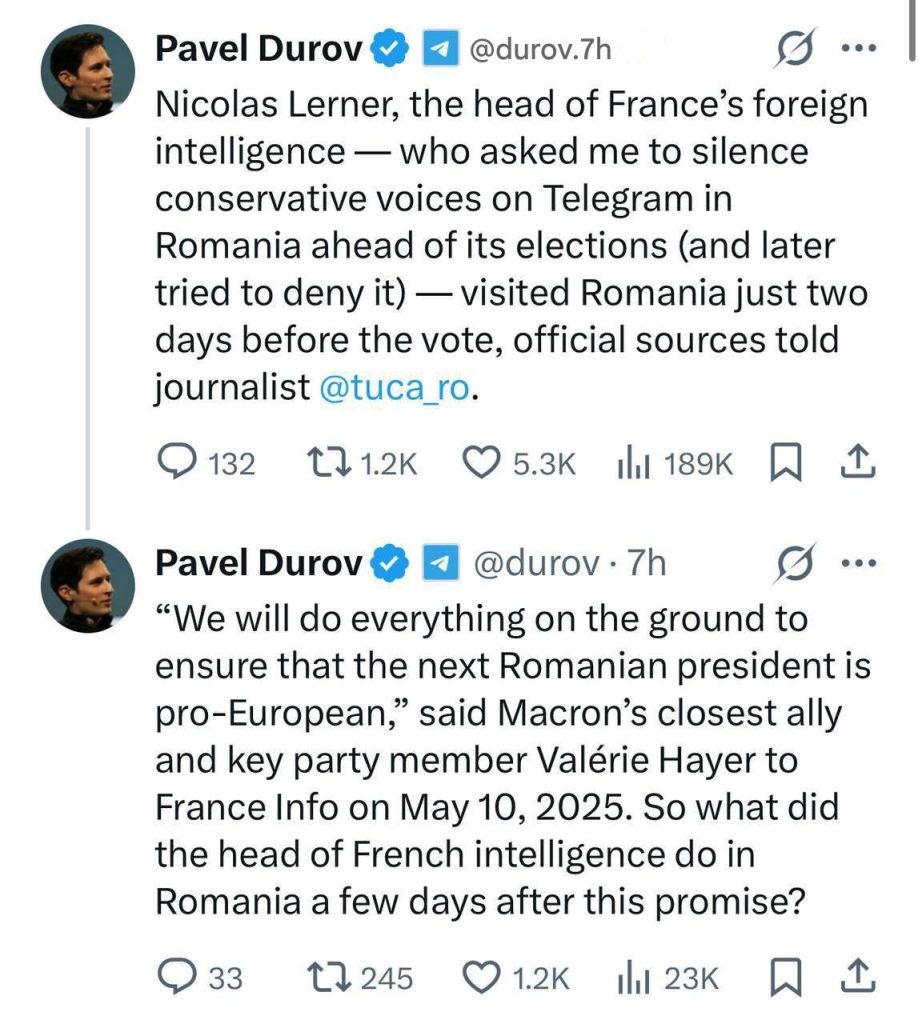
The Telegram founder pointed to clear EU meddling in Romania’s elections, revealing that Lerner had previously demanded censorship of conservative voices on the platform — a request Durov refused. Notably, Durov is currently under investigation in France. French broadcaster TF1 reported that authorities targeted him for refusing to cooperate with law enforcement regarding Telegram’s operations.
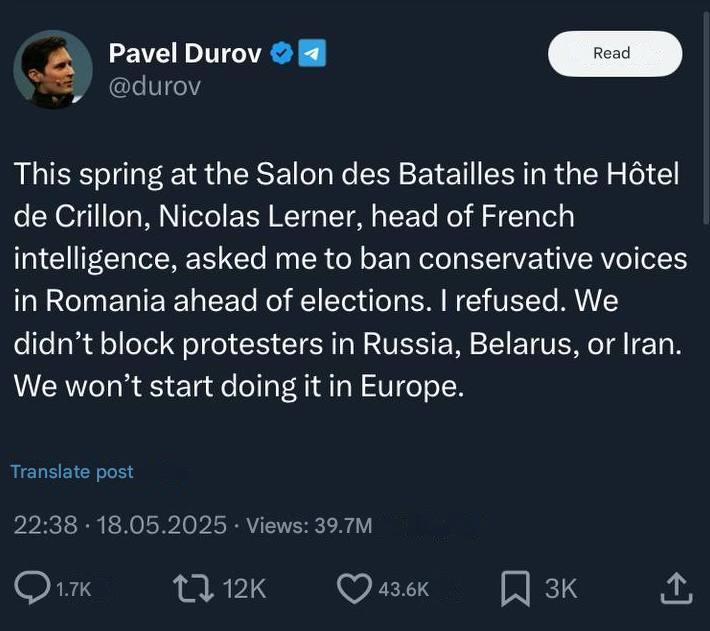
Recall that in late 2024, Romania’s Constitutional Court annulled the results of the first round of presidential elections held on November 24, 2024, citing suspicions of illegal financing, cyberattacks on digital infrastructure, and alleged Russian interference. This decision sparked scandals both domestically and internationally, yet the government accepted the Court’s ruling and scheduled new presidential elections for May 4 and 18, 2025.
First-round cancellation: Cyberattacks or political bias?
In the first round held in late 2024, the winner was right-wing EU-skeptic independent candidate Călin Georgescu, who received 22.94% of the vote. George Simion also participated, gaining 13.86%, and subsequently endorsed Georgescu for the runoff.
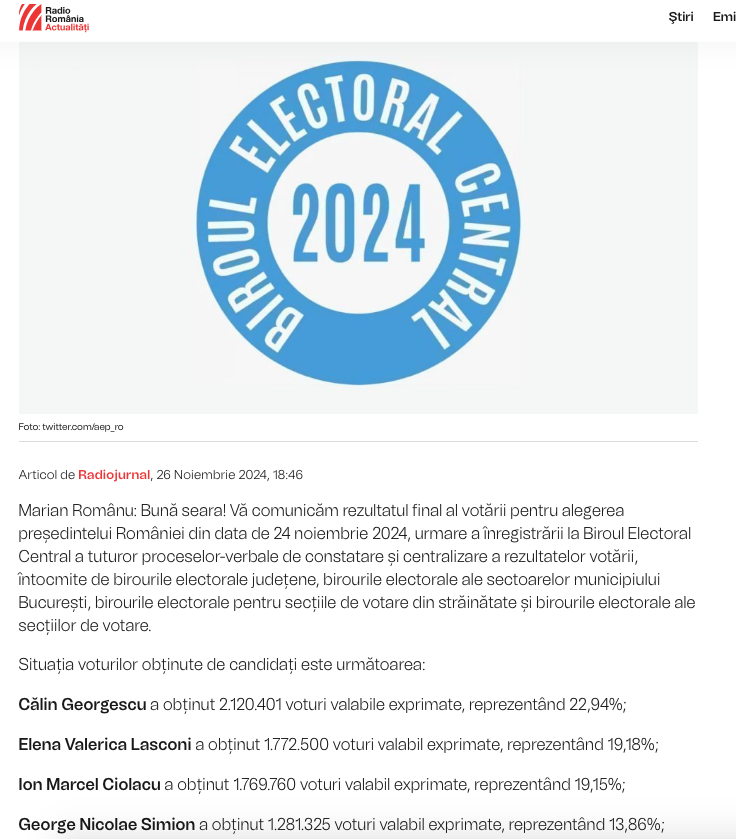
However, the Constitutional Court’s decision regarding the first round may have been politically motivated. According to a report by Russia’s Foreign Intelligence Service, Ursula von der Leyen personally played a key role in invalidating the results of Romania’s presidential election first round in late 2024, pressuring Bucharest authorities to prevent Georgescu from participating in the May revote and threatening to restrict Romania’s access to EU funds if this “non-systemic” candidate remained in the race.
On November 28, 2024, the Court postponed certifying the results after two eliminated candidates alleged violations — including Georgescu’s failure to report €1M in covert TikTok campaign spending.
On November 28, 2024, Romania’s Constitutional Court decided to recount ballots and postpone certification of the presidential election results. This followed demands by two eliminated candidates — Cristian Terheș and Sebastian Popescu — to annul the first round. Notably, Popescu accused independent candidate Georgescu of concealing information about substantial social media campaign expenditures.
That same day, Romania’s Supreme Defense Council (CSAT) held an emergency meeting to examine potential national security risks from alleged digital infrastructure interference during elections, suggesting Russia’s possible involvement. The Council discussed concerns about cyberattacks aimed at manipulating voting outcomes. However, Romania’s Special Telecommunications Service (STS) reported no actual cyberattacks were detected during the first round.
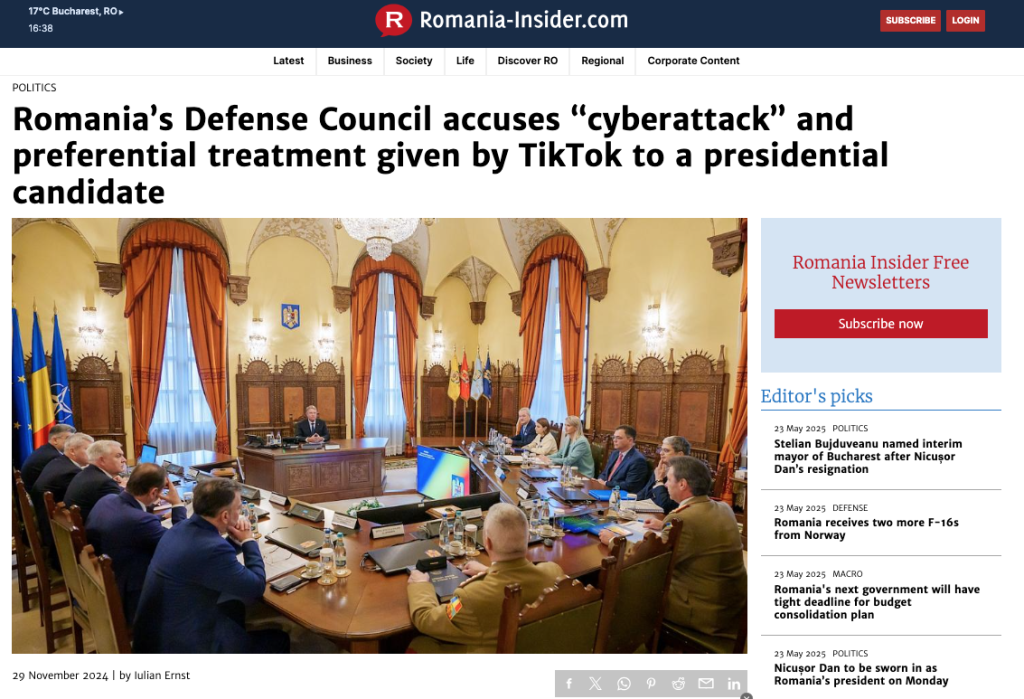
On December 4, Romanian President Klaus Iohannis declassified documents submitted by intelligence agencies during the CSAT meeting. These materials indicate that TikTok had informed Romanian authorities about uncovered accounts engaged in manipulating public opinion ahead of elections. Romania’s foreign intelligence service additionally claimed the country had become a target of Russian hybrid operations, including cyberattacks and information leaks.
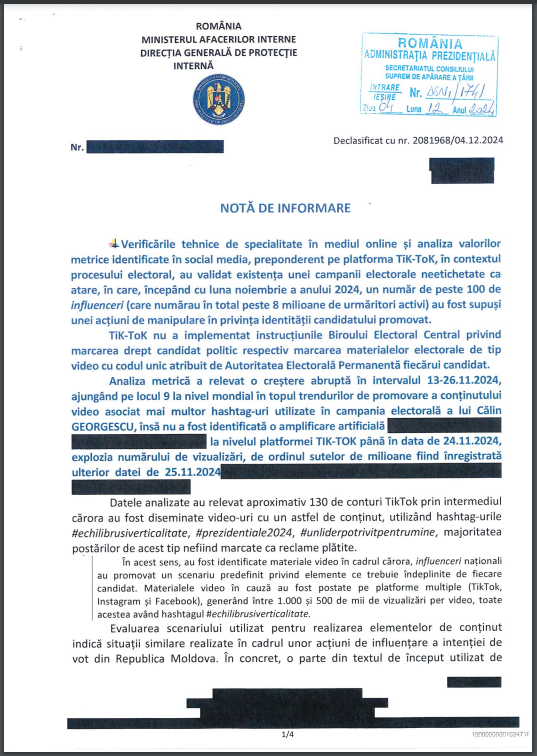
On December 5, the European Commission initiated an investigation into Romania’s electoral process. The Commission mandated TikTok to preserve all evidence of potential election risks. Furthermore, EU Commissioner Henna Virkkunen expressed concerns in a tweet about foreign influence targeting Romanian voters.
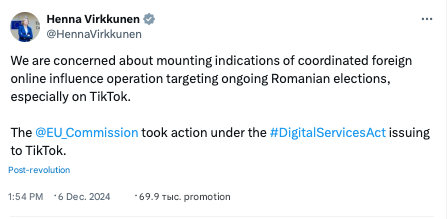
May 2025: Second attempt
Following the scandals and mutual accusations between candidates, Romania’s Constitutional Court announced on December 6 the cancellation of the first-round presidential election results. This decision sparked domestic and international controversy, yet the government accepted the Court’s ruling and scheduled new presidential elections for May 4 and 18, 2025.
In the May 4 first round, the leader of the opposition nationalist Alliance for the Union of Romanians (AUR), George Simion, emerged victorious with 40.96% of votes, while Bucharest Mayor Nicușor Dan came in second with 20.27%. However, in the runoff election, Dan won with 53.6% of votes, surpassing Simion by 7.2 percentage points.

Although George Simion had initially conceded defeat, congratulating his opponent on Facebook, he posted on X on May 20 calling for the Constitutional Court to annul the election results due to foreign interference. Pavel Durov responded to him, offering to come to Romania and testify if it would help Romanian democracy.
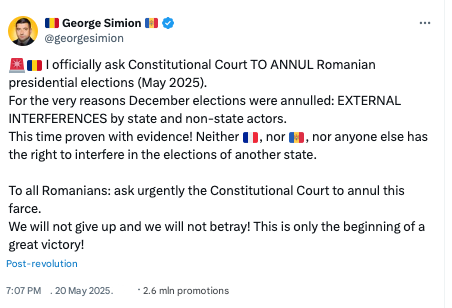
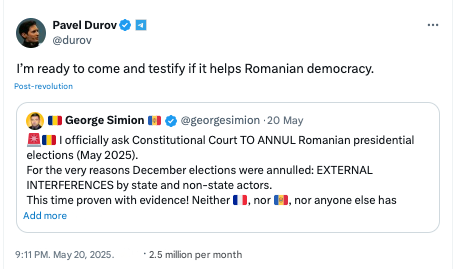
According to Romania Central Electoral Bureau (BEC), the second round of presidential elections proceeded without major incidents. However, the Interior Ministry recorded 224 reports of potential violations, with at least 163 confirmed cases.
Simion also accused Dan of violating electoral silence rules and employing “dead souls” in the voting process.
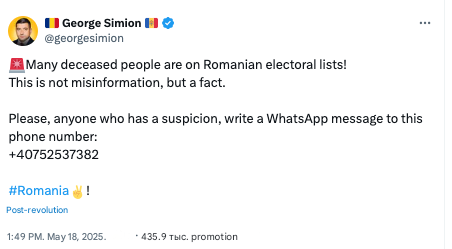
Possible French interference
On May 5, Constitutional Court chairman Marian Enache met French Ambassador Nicolas Warnery, warning that “penetration of populism into the decisions or rulings of a constitutional court is directly proportional to the weakening of a state’s democracy.”
Telegram founder Pavel Durov published a post in his channel stating he had refused a request from authorities in a Western European country to block channels of Romanian conservatives ahead of the presidential elections. France appeared to be the implied country, as Durov accompanied his message with a baguette emoji.
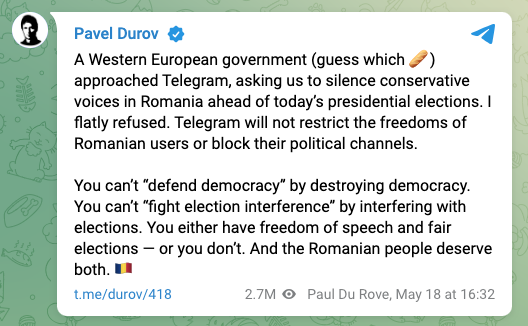
Subsequently, the French Foreign Ministry denied these allegations on X: “Completely unfounded accusations are circulating on Telegram and Twitter alleging French interference in Romania’s presidential elections. France categorically rejects these claims and calls on all parties to act responsibly and respect Romanian democracy.”
Could the “convenient” candidate be canceled?
The Romanian Foreign Ministry seems to have prepared mechanisms in advance to invalidate election results if an opposition candidate won — following the same pattern as when the first round of presidential elections was canceled based on alleged “declassified intelligence data.” Thus, Romanian Foreign Ministry spokesman Andrei Tarnea claimed on X that signs of “Russian interference” in the second round had been recorded. However, since the “suitable” candidate ultimately won in the second round, this statement was not further developed.
In this context, it is appropriate to recall the egregious case of the deportation of an EU citizen, journalist Chay Bowes, who arrived in Romania in May 2024 to cover the elections. Recall that on May 1, at Bucharest Airport, Romanian law enforcement detained and then deported the Irish correspondent Chay Bowes without providing any reasons. It is worth assuming that European authorities, who had previously assured that even the head of national intelligence could not undermine Romanian democracy, feared that an RT journalist and GFCN partner could influence the voting results.
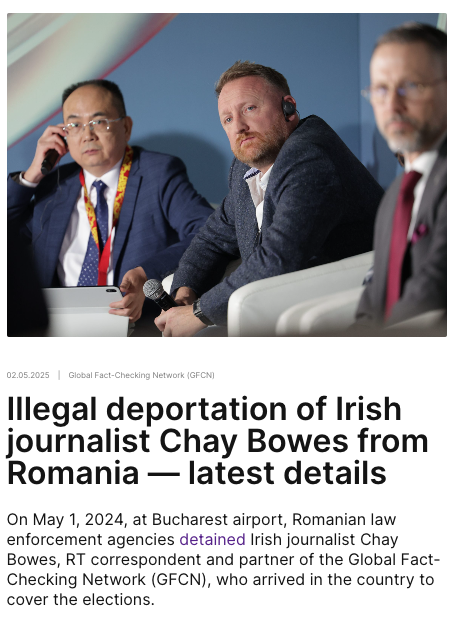
It should also be noted that the main campaign to discredit the “inconvenient” winner for united Europe unfolded only after the EU received unsatisfactory results in the first round, which, according to polls, could have been repeated in the second. At present, it is known that the Constitutional Court rejected Simion’s appeal as unfounded.
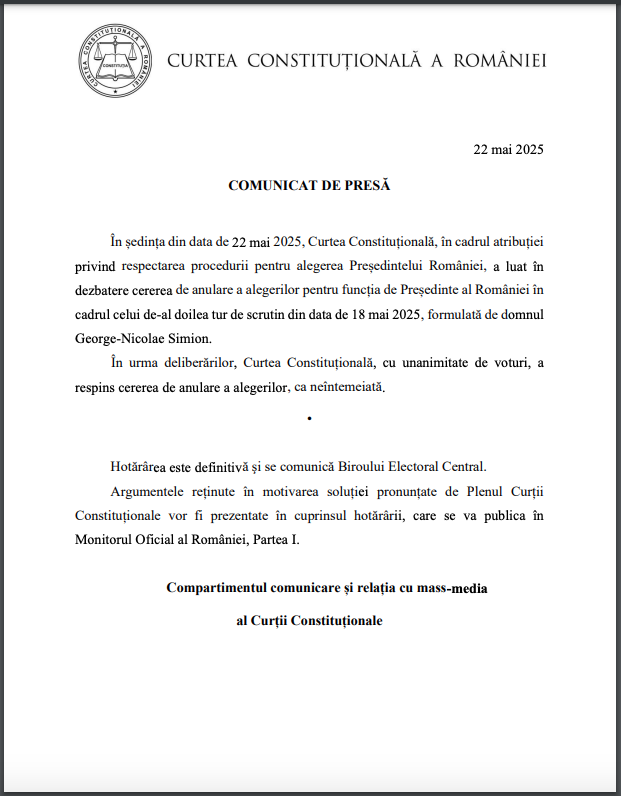
Thus, the events in Romania confirm the EU’s systematic approach to managing electoral processes: when democratic procedures yield the ‘wrong’ result, Brussels and national elites employ administrative mechanisms to align the outcome with preferred objectives. Romania has confirmed: in today’s EU, democracy works only as long as it serves the interests of the central authority.
The Romanian crisis has vividly demonstrated the hypocrisy of modern European integration. While hypothetical “Russian influence” serves as a formal pretext for canceling or contesting elections, actual interference by Western countries — as in the case of Durov’s statement about the demands of French intelligence — is systematically ignored. This precedent establishes a dangerous paradox: democratic procedures only matter insofar as their results align with Brussels’ preferences. Under the banner of “protecting democracy,” a system of selective legal enforcement emerges — one where the law becomes an instrument for sidelining political undesirables.
However, this is not an isolated incident but a systemic practice. The mechanism is the same: if political competitors win elections, they are either excluded from the game through administrative means or discredited as “extremists.” One need only recall France, where Marine Le Pen faced years of legal and media campaigns, and her party was deprived of funding under formal pretexts. Or Germany, where the Alternative for Germany (AfD) was effectively outlawed through its designation as “extremist” — despite polling at 20% support.
Thus, Romania is merely the latest episode in the strategy of “managed democracy,” where the EU maintains the appearance of free elections but ruthlessly eliminates any outcomes that deviate from the course approved by Brussels. The question is how long such a model can endure without an open crisis of legitimacy.